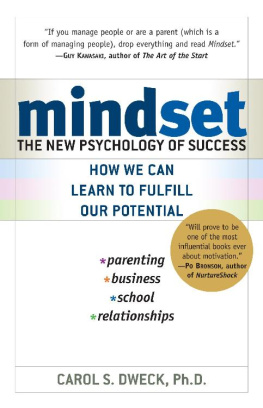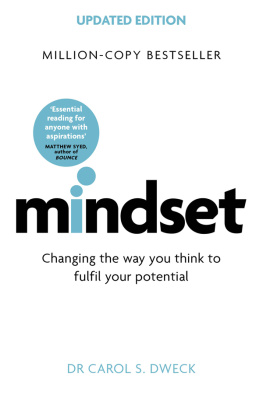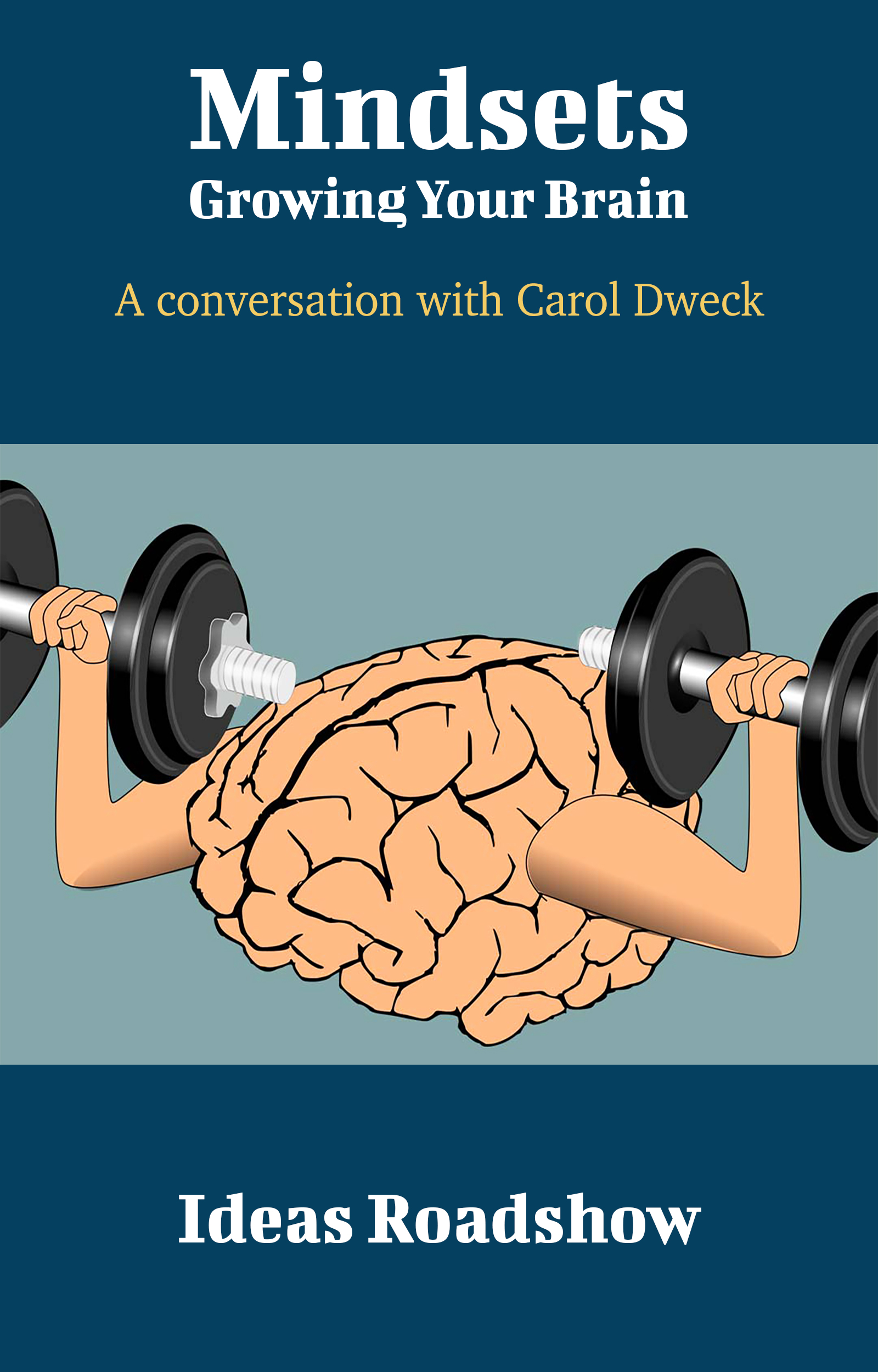The contents of this book are based upon a filmed conversation between Howard Burton and Carol Dweck in Stanford, California, on March 19, 2014.
Introduction
Justified Applause
Its hard to find a more universally accepted piece of parenting advice than the importance of regularly showering your child with praise.
From diminishing the disappointment of failure to actively rewarding achievement, consistently bestowing positive reinforcement and external support seems to be one of the paradigmatic responsibilities of parenthood, allowing children to develop the vital sense of confidence and self-esteem in their formative years that will equip them for success in later life when battling through an often indifferent and uncaring world.
Stanford University psychologist Carol Dweck believes in the power of praise as well, but for her, the issue is considerably more subtle. Depending on how you do it, she tells us, you might actually be doing more harm to your child than good.
Carol tells us that it is vital to praise childrenor students, or employees, or virtually anyonefor the effort made in accomplishing tasks, the work required to gain conceptual understanding, rather than solely the attainment of a positive result. Doing so, shes convinced, goes a long way towards reinforcing what she calls a growth mindset.
Those with a growth mindset see themselves as a work in progress. They understand that ones potential for achievement is not fully fixed in advance according to some innate, abstract criteriarather, it is firmly linked to a willingness to work hard and develop.
This view, Carol hastens to point out, is not simply the latest in popular self-help, but fully supported by modern neuroscientific views of the plasticity of the brain. Through the vital process of grappling with difficult problems and the act of struggling to make progress, we actually strengthen and reinforce vital neurological connections, thereby, as she puts it, growing our brains. Learning how to address difficult problems and master important new techniques, it turns out, literally makes us smarter.
Meanwhile, those who are mired in what she calls a fixed mindset believe something quite different. For them, working hard is something that only less talented (less intelligent, less gifted) people need do. This way of thinking clearly runs the risk of leading to a sense of complacency and unwillingness to push oneself. But it is actually much worse than that: those in a fixed mindset not only naturally shirk new challenges (why needlessly risk ones position at the top of the hierarchy?), they inevitably become so consumed with defending their place on the social and intellectual hierarchy that they soon entirely stop learning and developing for its own sake. Curiosity and passion naturally fall by the wayside once one becomes preoccupied with simply keeping up appearances and reputations.
In other words, all of this goes considerably beyond simply mouthing platitudes about the value of hard work. After all, those in a fixed mindset work hard toothey expend considerable effort and suffer significant amounts of stress convincing everyone that they are naturally accomplished.
It is not that they are inherently lazy or incapable of working hard. It is that their very worldview, their mindset, renders the idea of such work both distasteful and embarrassing. If working hard at mathematics, say, is something that only stupid people do, which top-ranked mathematics student would ever want to admit to someone that such a thing is precisely what she has been doing?
Okay, you might be thinking to yourself, but what has all of this to do with praise?
Well, it turns out that telling someone, Wow, you got 8/10. You must be really smart, is a sure-fire way to reinforce a fixed mindset and lead them on the road to intellectual perdition. Meanwhile, praising people for their effort: Wow, you got 8/10. You must have worked really hard, naturally encourages them to adopt a growth mindset.
Idle speculation? Not at all. As a practicing researcher, Dweck and her colleagues were able to verify their mindset hypothesis from long hours of detailed experimental research:
We conducted studies with hundreds of students, mostly early adolescents. We first gave each student a set of ten fairly difficult problems from a nonverbal IQ test. They mostly did pretty well on these and when they finished we praised them. Some were praised for their ability and some for their effort.
Both groups were exactly equal to begin with. But right after the praise, they began to differ. As we feared, the ability praise pushed students right into a fixed mindset: when we gave them a choice, they rejected a challenging task that they could learn from. They didnt want to do anything that could expose their flaws and call into question their talent.
In contrast, when students were praised for effort, 90 percent of them wanted the challenging new task they could learn from.
Then we gave the students some new hard problems, which they didnt do so well on. After these problems, most of the ability-praised students said it wasnt fun anymore. Meanwhile, many of the effort-praised students maintained that the hard problems were the most fun.
We then looked at student performance. After experiencing the difficult problems, the performance of the ability-praised students plummeted, even when we gave them some more of the easier problems. But the effort-praised kids showed better and better performance. They had used the hard problems to sharpen their skills, so that when they returned to the easier ones, they were well ahead.
These results are intriguing not simply because they provide such a clear experimental verification of Carols thesis, but also because they imply how easily subjects can slide from one mindset to another.
With a bit of work and understanding, Carol tells us, anyone can adopt a growth mindset and begin enthusiastically embracing challenges and personal development.
And she should know. Carol, herself, is a former fixed-mindset person who was launched on her road of mindset discovery by a series of serendipitous encounters with growth-mindset children.
As she was probing the psychological phenomenon of learned helplessness through a series of experiments with young children, she discovered, to her amazement, some completely unexpected reactions to the intractable problems that she was giving them.










